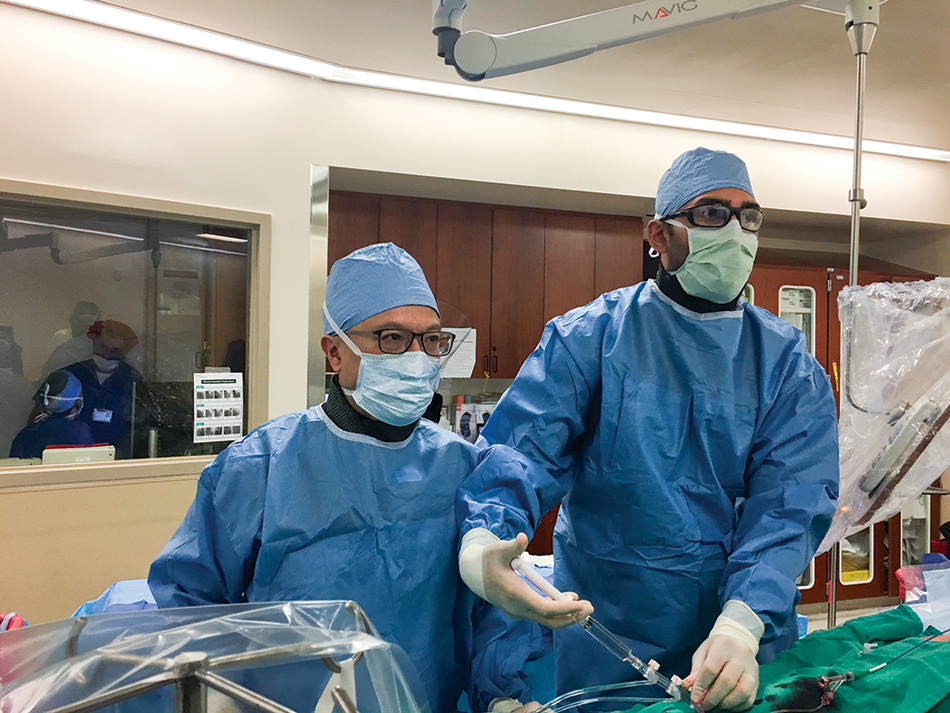Perspective | Interventional Sweat: Early Lessons from Interventional Cardiology Fellowship

"How is your interventional cardiology fellowship going?" I have been asked this question in some form multiple times by family, friends, and colleagues alike. And I normally respond with a one-word answer. Not because I am too tired to articulate my thoughts and feelings — which I am well-versed in doing because my wife is a psychiatrist — but because a single encapsulating word is usually fitting. Awesome. Humbling. Challenging. Brutal. Rewarding. And it’s only September.
For me, no experience during my internal medicine residency and general cardiology fellowship compares with the range and intensity of emotions that I encounter on a day-to-day level as an interventional cardiology fellow. My previous training has effectively been a steady ascent to the top of a thrilling roller coaster ride. As I look back on the first few months of this gratifying ride, the many confidence-building highs coalesce into a blur. The lows, however, remain palpably clear and have provided me with critical opportunities for learning and self-growth.
Given the vast scope of procedures we perform, the technical learning curve is quite steep — wiring difficult lesions, bifurcation PCI and chronic total occlusion PCI, to name a few. Building and solidifying one’s procedural skillset invariably involves complications and failures. Yet we as fellows tend to unduly persevere through these moments. Here’s a recent case of mine that highlights the typical trials and tribulations of interventional training and some simple tips to tackle them.
I’ll never forget the first time I lost wire position this year. Mrs. LD was a 70-year-old woman with hypertension, hyperlipidemia and end-stage renal disease on hemodialysis referred for coronary angiography in the setting of an NSTEMI. A seemingly straightforward PCI of a calcified, high-grade mid-obtuse marginal branch lesion turned into a harrowing case of no-reflow after initial angioplasty. Vessel calcification and tortuosity prevented easy stent delivery. As I tried to “Dotter” the stent beyond the lesion, the guiding catheter unfortunately prolapsed, and I lost wire position. With Mrs. LD complaining of worsening chest discomfort, I scrambled to re-wire the true lumen and advance a guide extension catheter for additional support. Fortunately, I was able to quickly re-wire the vessel, and stent deployment along with intracoronary nitroprusside re-established normal distal coronary flow, relieving her symptoms.
"As I removed my lead, my attending patted me on the back and remarked, “That’s interventional sweat. Welcome to fellowship.”
I was drenched in sweat. As I removed my lead, my attending patted me on the back and remarked, “That’s interventional sweat. Welcome to fellowship.” Having played competitive sports my entire life, high-pressure situations and bouncing back from failure are not new to me. In the interventional cardiology arena, failure does not wash off as easily. Mistakes can affect lives. I replayed the case over and over on my drive home, mulling over each step. Should we have prepared the lesion with rotational atherectomy? Should we have used guide support upfront? Why did I push the stent so hard? Thank God I did not wire into a dissection plane! I tried telling myself that even the most skilled attendings are indeed fallible and were once fellows like me, but that did little to comfort me. What ultimately provided me solace – and what I would like to impart to future interventional fellows – are the “3 L’s”: Listen, Learn and Lean.
Listen. The day after this case, I asked my attending for feedback. And I just listened, taking it all in. In this vulnerable state, I not only gained an important lesson in humility, but also one that I now remind myself before every PCI: Respect the lesion. I underestimated the potential complexity of Mrs. LD’s case, so I was unprepared when things went south, rather than having a game plan, and like in chess, being three steps ahead.
Learn. I owed it to future patients to use Mrs. LD’s case as a learning opportunity. So I ran her case by my interventional mentors, asking each of them how they would have approached it and what they would have done differently, down to the very last detail. It seems obvious, but I cannot stress how valuable this exercise is. A robust procedural armamentarium contains both an array of technical skills as well as strategies.
Lean. One of the most difficult aspects of our job is the requirement to quickly detach and move on from complications. Lean in to this challenge, because the next patient on the table needs your complete attention. But you also need to process these moments. Lean on your co-fellows, lean on your mentors and lean on your loved ones for support.
For all future interventional cardiology fellows, I hope the “3 L’s” provide you with a sense of closure and professional and personal growth following tough cases. As you embark on your own roller coaster through interventional training, keep them in mind. And most importantly, keep your hands up and enjoy the ride!
Tweet this article: Tweet
This article was authored by Rushi Parikh, MD, interventional cardiology fellow at Stanford University, whose clinical and research interests lie at the crossroads of interventional cardiology and advanced heart failure/heart transplantation. After finishing interventional fellowship, Parikh plans to pursue a career in academic interventional cardiology with a clinical research focus on cardiac allograft vasculopathy.
 |
|
| Click the cover image above to read the latest issue of Cardiology: Interventions in e-pub format or click here to read it on the web! | |
Clinical Topics: Cardiac Surgery, Dyslipidemia, Invasive Cardiovascular Angiography and Intervention, Noninvasive Imaging, Prevention, Sports and Exercise Cardiology, Aortic Surgery, Interventions and Imaging, Angiography, Nuclear Imaging, Hypertension, Sports and Exercise and Imaging
Keywords: ACC Publications, Cardiology Interventions, Atherectomy, Coronary, Fellowships and Scholarships, Coronary Angiography, Learning Curve, Mentors, Myocardial Infarction, Emotions, Kidney Failure, Chronic, Renal Dialysis, Angioplasty, Internal Medicine, Sports, Stents, Hypertension, Hyperlipidemias
< Back to Listings

